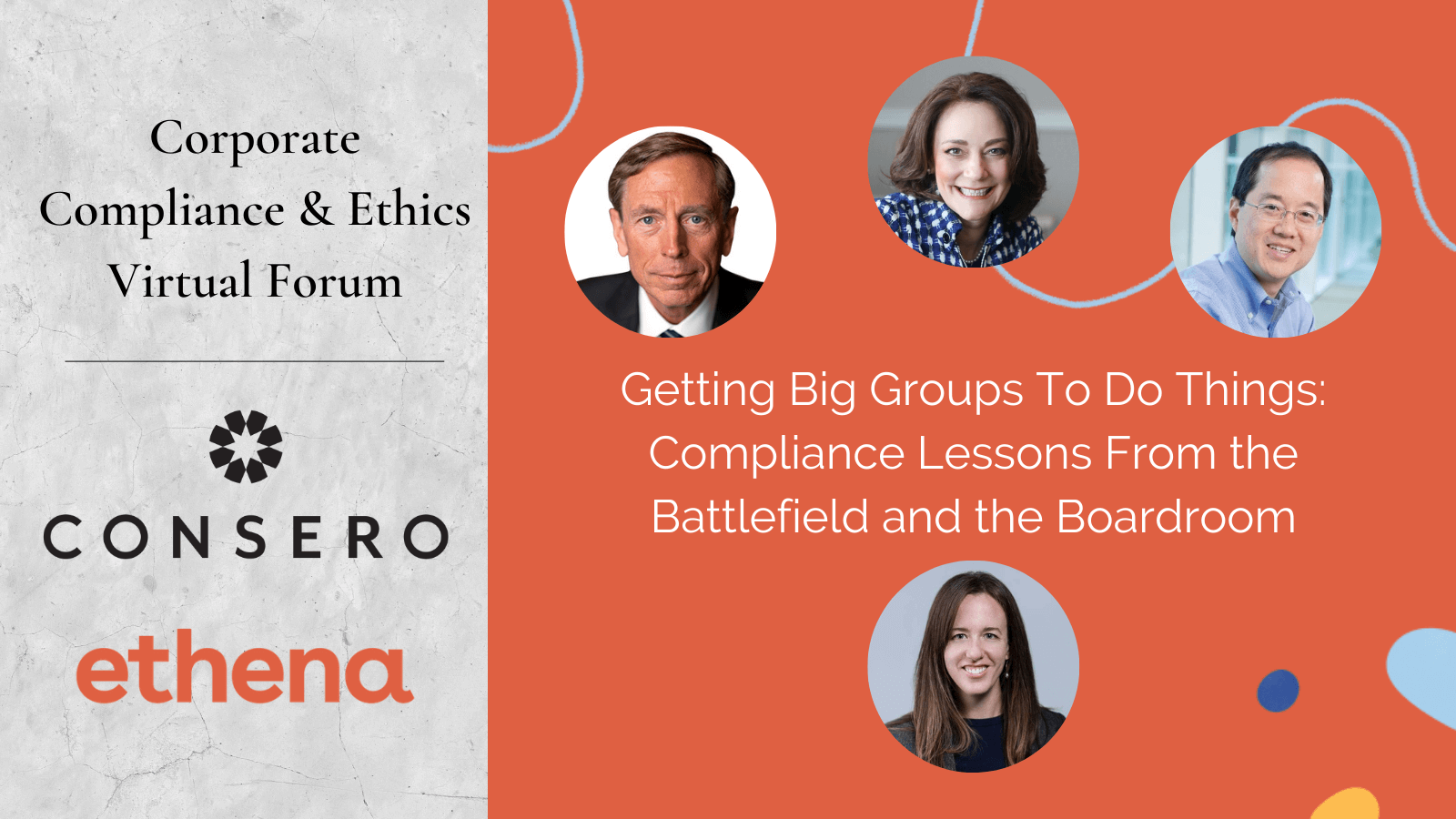Ethena opened Consero’s Compliance & Ethics Forum with advice from leaders who know just what it takes to make a big difference in a big organization
This week, Ethena had the honor of opening Consero’s Corporate Compliance & Ethics Forum with a panel on “Getting Big Groups To Do Things: Compliance Lessons From the Battlefield and the Boardroom.” Hosted by Ethena CEO Roxanne Petraeus, the panelists included Ethena advisors Cindy Moerhing and Leonard Shen as well as General (Ret.) David Petraeus, a two-time investor in Ethena. All three panelists have had extensive experience in global leadership, and each is an individual success story in “getting big groups to do things.”
As you can imagine, our esteemed panelists had plenty of advice on effective leadership and executing stellar compliance programs! We’ve highlighted some of our key takeaways below:
Lead by Example and “Find Your Fulcrum”
- Even massive organizations like Visa, Walmart, and the US Army know that leading by example still makes a big difference in showing employees (and soldiers) that leaders–from CEOs to direct reports–care about their company’s health and culture.
- Leading by example means visibly and in-person! Showing up for the things that matter is something that employees from all levels understand implicitly.
- When it comes to compliance, there’s more than one way to show leaders care about their employees. In some companies, this might manifest as a quarterly compliance check in with the CEO. In others, this might mean “finding your fulcrum”–identifying key local leaders and arming them with real and relevant compliance scenarios to prompt “what would you do?” conversations with their employees on a regular basis.
Compliance Can Be Competitive
- Robust compliance programs lead to strong organizational culture. (Cindy mentioned ECI’s 2021 survey that directly links good compliance to positive company culture.) Viewing compliance as not only a priority, but a competitive advantage is key to building a healthy company.
- Leaders are responsible for both the culture they create and the culture they fail to create. Being transparent about organizational shortcomings creates an incentive for managers to always leave the best impression on their peers and employees.
- Regular, transparent assessment of compliance programs is essential to making training that really works on a company-wide scale. Specifically, compliance leaders should take strides to regularly examine leadership to make sure everyone’s walking the walk as much as they’re talking the talk.
Transparency, and Why Bad News Should Travel Quicker than Good News
- Making feedback an accessible and regular part of company culture can make employees feel empowered to speak up directly about any kind of issue at work, rather than discouraging feedback by directing them to HR for every complaint.
- Transparency is key to building organizational culture. If you want to include every employee in the most important conversations, you have to make sure you’re sharing good news, bad news, and criticism alike. People are more likely to listen when they feel that they’re heard.
- In the best organizations, bad news always travels faster than good news. Bad news means problems to solve, and the faster a plan of action is formed to solve it, the better.
- If you really want to make compliance and ethics important to your staff, it’s important to communicate the “why” behind the training. Specifically, ditch “the legal hat” for these conversations; talk to your colleagues about why the training is important to your organization long before you mention legal requirements. Adult learners take more from their training when they understand what they’re building with you.
A huge thank you to Consero for having us and to Cindy, Len, and General Petraeus for taking the time to share their wisdom with us!









